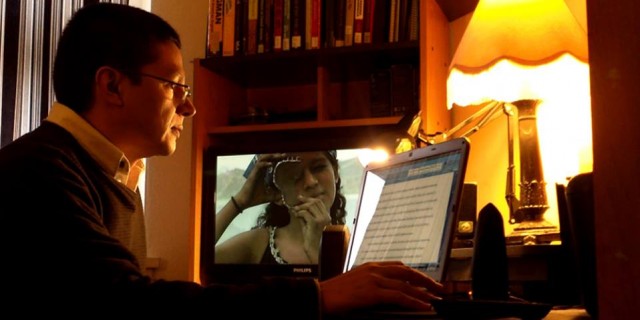Honduran filmmaker, Hispano Durón, looks to a creative future making films and teaching at the University of Honduras after successfully achieving his Ph.D in film and media studies.

Being a filmmaker in Honduras is no easy feat. That didn’t stop KU doctoral student Hispano Durón from writing and directing the first Honduran feature film of the millennia – and only one of a few Honduran feature films ever.
With no film school in the country, Durón left home early to pursue his dream. He received his bachelor’s degree in film from the Escuela Internacional de Cine y Televisión, a school founded by recently deceased Colombian writer, Gabriel García Márquez, and legendary Argentine filmmaker, Fernando Birri.
After producing several documentaries, receiving his master’s degree from the University of Southern California, and producing his feature film, Durón settled into life in academia.
“I like it, life in academia. I like teaching, but I was also thinking about working in research,” he said. “I thought it was a good time in my life to do a PhD – and my wife and daughter were happy to spend some time in the United States as well.”
Now, after five years at KU pursuing a doctorate in film and media studies, Durón will graduate this May and return to Honduras as a professor and filmmaker.
Durón has spent his time at KU focusing on the new Central American cinema, a film movement that emerged in the 2000s. Durón was “interested in looking for the filmmaking conditions in Central America, what factors characterize the filmmaking conditions there, and also which were the most recurring themes in the films.”

Upon arriving at KU, Durón was surprised by the resources here.
“Before coming here, I couldn’t imagine that I could find a film department with a state of the art sound stage or a Center for Latin American and Caribbean Studies,” Durón said. “They were very supportive of me.”
Durón’s research also would not have been as complete without the additional financial support from KU for research trips back to Central America on three separate occasions.
“I believe my dissertation will motivate filmmakers in the region to make more films about our local stories, taking advantage of the accomplishments Central American filmmakers had in the past decade,” he said.
Durón happens to be one of those accomplished Central American filmmakers.
“Anita, the Insect Catcher,” his feature film, had people flocking to theaters to see their country’s first such production. The theater owners saw it as an experiment.
“They wanted to see what happens screening a Honduran film. And it worked,” said Durón. “And after that, other filmmakers were motivated, and other films came.”
Durón’s success making and distributing a film in Honduras was a challenging endeavor. He had to find funding from European organizations that support film in developing countries. It was a long process, but one that paid off in more ways than he anticipated.

“Before my film, aspiring filmmakers did not know about making films in Honduras,” he said. “After my film, they knew it was possible, and they were encouraged to follow the path.”
As Durón prepares to return home, his thoughts are of publishing his dissertation in Spanish and submitting it to research competitions in Central America. He is looking forward to returning to teaching and hopefully new challenges at his university. But he also wants to keep creating.
“Yeah, definitely I want to make more feature films in Honduras.”
